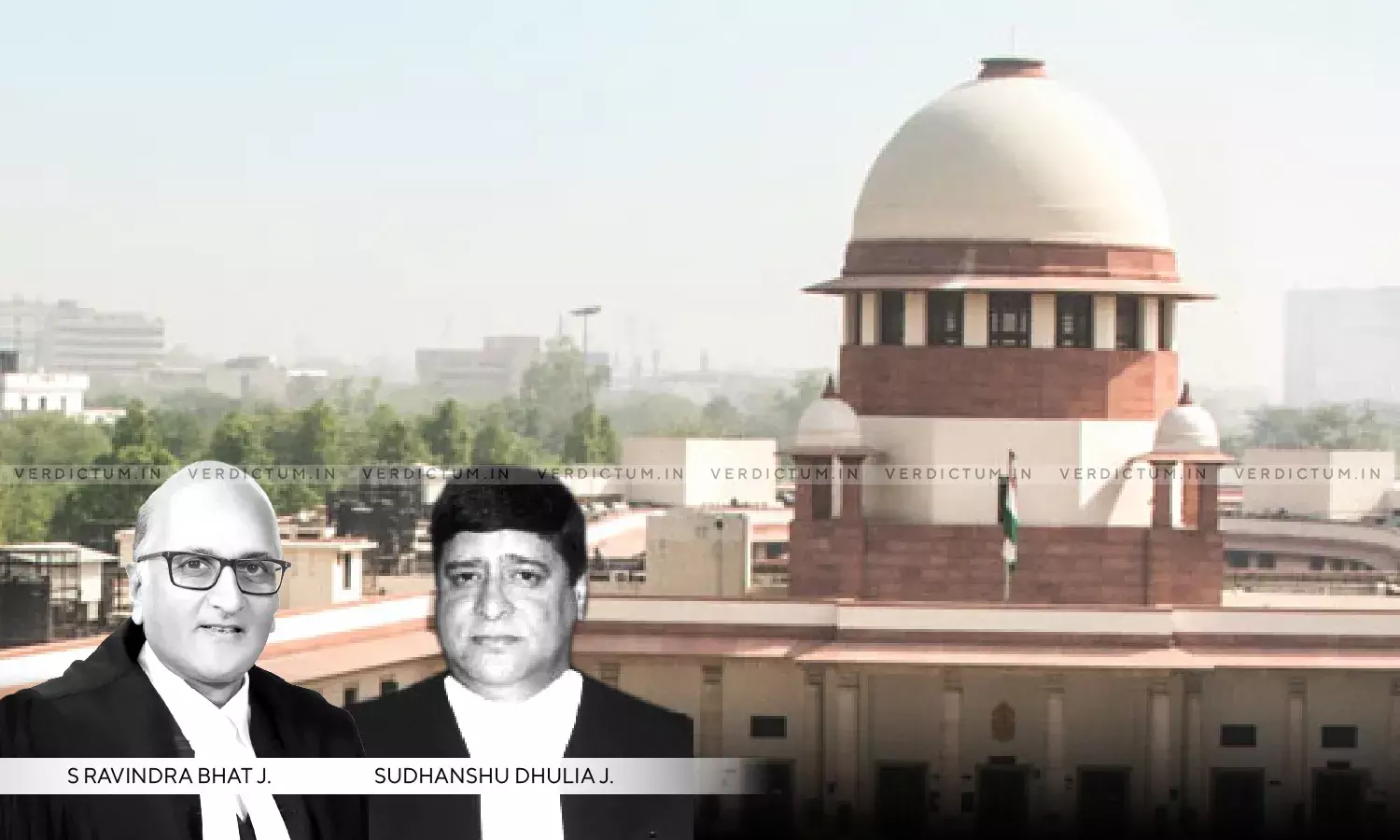Article 1737 Portuguese Civil Code: Rights Of Heirs Of Property Do Not Extinguish Upon Death- SC Confirms

A Supreme Court Bench of Justice S Ravindra Bhat and Justice Sudhanshu Dhulia heard an appeal against a judgment passed by the Bombay High Court regarding inventory proceedings under Chapter XVII by Articles 1369 to 1447 of the Portuguese Civil Procedure Code.
Upholding the judgment of the High Court, the Court observed that Article 1737 of the Code is cast in wide terms, and the rights of the heirs of property do not extinguish upon their death.
Counsel Keane Sardinha appeared for the Appellant and Counsel Vibha Dutt Makhija appeared for the Respondent.
In this case, inventory proceedings were initiated in 1985 under the Portuguese Civil Procedure Code, on account of the death of Lt. Guilherme Caetano Souza and his wife, Maria Guilhermina Augusta Lourdes Aguiar Souza. There were six heirs of the deceased, i.e., Pedro, Hermano, Maria Emilia Pulqueria Natividade, Maria Patricia Lucia, Maria Emilia Julieta and Edwin.
The estate in question comprised of three items of immovable property. Edwin succeeded two times through auction. The third piece of property was in dispute.
The disputed property had also been auctioned and Maria Emilia Souza was the highest bidder. However, she defaulted on the payment of the owelty amount, and consequently, a fresh bid was ordered. In the second auction proceedings, Hermano was successful and he was appointed as the administrator (Cabeca de Casal under the Code). The administrator is tasked with preparing the inventory of all the properties of the deceased, and after the evaluation, they are distributed in accordance with the shares laid down in the code.
Hermano passed away 3 years later, without depositing any amount towards his bid. The partition chart had also not been drawn. This was reported to the concerned court and the property was seized of inventory proceedings. At the same time, an application was moved by Pedro's heir for being impleaded as a party to the proceedings.
The Appellant moved an application for the appointment of a fresh administrator and the re-auction of the disputed property. The claim for reauction was resisted by Hermano's heirs, who argued that they could continue the proceedings and were entitled to the disputed property.
The Trial Court allowed the Appellant's application. Hermano's heirs appealed against the order and the District Judge reversed the ruling of the Trial Court. Aggrieved, the Appellant approached the High Court which upheld the ruling of the District Court.
The Appellant approached the Supreme Court.
After perusing the provisions of the Code and judgments in cases like Baburao Karekar v. Vilas Atmaram Bandodkar, the Court opined that "upon successfully bidding in an auction, the amount to be paid in by the concerned heir is payable upon a demand by any other heir to such bidder, asking for the amount to be deposited. The limitation period, so to say, is dependent upon the demand so made. The rationale for this rule is that till the amount in excess of such bidder's share is not computed, they remain in the dark about the sum to be paid. In the present case, it is not disputed by the appellant that such a demand was not made; the parties were not notified as to the amounts they were entitled to; or that the respondent did not make the demand."
Analyzing the issue of the rights of Hermano's heirs to succeed to his entitlement to the item bid for is concerned, the Court opined that since Article 1737 – which covers the concept of inheritance – is cast in wide terms and declares that the "inheritance" covers all properties, rights and obligations of the author, which are not merely personal or which are otherwise excepted by the disposition, it could not be said that Hermano's right to participate and claim property extinguished upon his death. In that context, it was opined that "The entitlement to bid in the licitation process was not a personal right, but in his capacity as a member of the family, of which he had been constituted as the Cabeca de Casal. If all other items are heritable by his heirs and legal representatives (as there is no dispute that they are, because they step into his shoes) an entirely different conclusion is unsupportable in regard to the item of property for which he bid successfully, but for which no demand was made, for payment of any amount. This was because, the final chart of partition containing the excess payments to be made, by one or other members of the family had not been prepared; no demand for payment or deposit of owelty was concededly made by any member of the family. However, that did not mean that the highest bid by Hermano was, in some inexplicable manner, effaced. His position and right as a successful bidder, and his obligation to pay the concerned amount, when called upon to do so, were heritable by his heirs and legal representatives."
Therefore, the Court found that the judgment of the High Court was sound, and consequently dismissed the appeals without an order on costs.
Cause Title - Mrs. Ethel Lourdes D'Souza Lobo v. Lucio Neville Jude De Souza & Ors.

